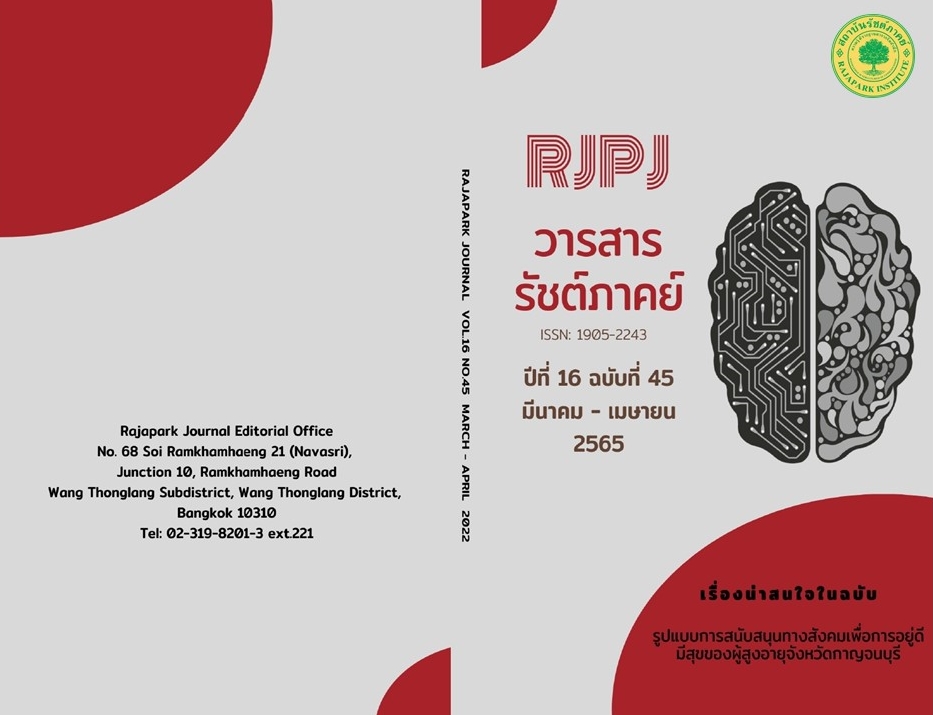A Comparative Analysis of student Scores in Managerial Accounting Course in the COVID-19 Situation
Main Article Content
Abstract
The coronavirus disease (COVID-19) has forced educational institutions from traditional on-site to online teaching and learning. The purpose of this study was to compare the average scores of students in the management accounting course at Rangsit University during COVID-19. Retrospective research was conducted. The population came from the student scores in the Management Accounting course for 4 semesters were semester 2 of the academic year 2019-2020, semester 1, semester 2 of the academic year 2020-2021, and semester 1 of the academic year 2021-2022, called Term 1, 2, 3, and 4, respectively, with 331, 304, 299, and 306 students, respectively. The statistics used were the normality test, the mean test with one-way analysis of variance and the Least Significant Difference (LSD) test; and the median test with the Krascal-Wallis test and the Mann-Whitney U test. The results showed that when switching from mixed on-site and online classroom in Term 1 to online teaching in Term 2, the mean (median value) was statistically significantly lower (p-value < 0.05) and had risen to close to Term 1 in Term 3 and Term 4. The teaching staffs still need to improve teaching and make students interested in participating (student engagement) in order to have better learning outcomes that are not different from classroom learning.
Article Details

This work is licensed under a Creative Commons Attribution-NonCommercial-NoDerivatives 4.0 International License.
Views and opinions appearing in the Journal it is the responsibility of the author of the article, and does not constitute the view and responsibility of the editorial team.
References
Adarkwah, M.A. (2021). A Strategic Approach to Onsite Learning in the Era of SARS-Cov-2. SN COMPUT. SCI. 2, 258. https://doi.org/10.1007/s42979-021-00664-y
Bork, R. H., & Rucks-Ahidiana, Z. (2013). Role Ambiguity in Online Courses: An Analysis of Student and Instructor Expectations. (CCRC Working Paper No.64). New York: Columbia University, Teachers College, Community College Research Center.
Emerging Infectious Disease Work, Communicable Disease Academic Development Group. (2021, August 18). Coronavirus Disease 2019 (COVID-19) Situation, Public Health Measures and Barriers to Disease Prevention and Control Among Travelers. Retrieved January 15, 2022, from https://ddc.moph.go.th/uploads/files/2017420210820025238.pdf
Ginzburg, S.B., Santen, S.A., & Schwartzstein, R.M. (2021). Self-directed Learning: A New Look at an Old Concept. Medical Science Educator, 31, 229–230. https://doi.org/10.1007/s40670-020-01121-w
Groebner, D.F., Shannon, P.W., Fry, P.C., & Smith, K.D. (2018). Business Statistics a Decision-Making Approach (10th ed.). Harlow, England: Prentice Hall.
Jayathavaj, V., Konthong, J., Chunsandee, V., Utsawapontanapat, S., Prakarnsamut, C., & Yuenyong, N. (2021). Analysis of University Students’ Grade Point Average Before and After COVID-19. In Proceedings of the 8th National and International Conference (pp.75-88). Pathumthani University.
Jongjaisurathum, S., Supparerkchaisakul, N., & Damsuwan, W. (2015). Self-Regulated Learning strategies of 21st century. Journal of Behavioral Science for Development, 7(1), 15-26.
Khasasin, R., Prachuabmoh, A., Khasasin, K., Rasmidatta, V., & Udomthanavong, S. (2021). Factors Affecting Online Teaching and Learning Among Students Thai-Nichi Institute of Technology. Journal of Legal Entity Management and Local Innovation, 7(8), 237-252.
Kheawnamchum, J., Anusasanan, S., & Wongnam, P. (2017). Theoretical Models and Researches Involving Causal Factors of Self-directed Learning. Journal of HR intelligence, 12(1), 125-140.
Lekakul, A. (2021). From Yesterday … to Today. Collection of Medical Education and Academic Articles in the 65 Years Resignation. Bangkok: Sahamitr Pattana Printing.
Littenberg-Tobias, J., Ruipérez-Valiente, J., & Reich, J. (2020). Studying Learner Behavior in Online Courses with Free-Certificate Coupons: Results from Two Case Studies. International Review of Research in Open and Distributed Learning, 21(1), 1-22. https://doi.org/10.19173/irrodl.v20i5.4564
Ministry of Higher Education, Science, Research and Innovation (MHESRI). (2020, January 16). Manuals and Practices of Higher Education Institutions in Teaching and Learning Management for the Academic year 2020. Retrieved January 15, 2022, from https://www.ops.go.th/main/index.php/news-service/announcement/2199-2563
MHESRI. (2020, January 23). Announcement of the Ministry of Higher Education, Science, Research and Innovation on Measures and Surveillance of Coronavirus (2000-nCoV). Retrieved January 15, 2022, from https://www.ops.go.th/main/images/2563/muaAdmin/corona/Thai.jpg
MHESRI. (2020, March 17). Announcement of the Ministry of Higher Education, Science, Research and Innovation on Measures and Surveillance of Coronavirus Disease 2019 (COVID-19) (No. 3): Actions of Higher Education Institutions to Prevent the Spread of COVID-19. Retrieved January 15, 2022, from https://www.ops.go.th/main/images/2563/muaAdmin/corona/COVID_3.pdf
MHESRI. (2021, July 17). Announcement of the Ministry of Higher Education, Science, Research and Innovation on Measures and Surveillance of Coronavirus Disease 2019 (COVID-19) (No. 17). Retrieved January 15, 2022, from https://www.mhesi.go.th/images/Pusit2021/pdfs/17-AnnCovid.pdf
Office of the Registrar, Rangsit University. (2021). Academic Calendar 2020-2021, 2019-2020.
Paul, J., & Jefferson, F. (2019). A Comparative Analysis of Student Performance in an Online vs. Face-to-Face Environmental Science Course From 2009 to 2016. Front. Comput. Sci., 1(7), Article number: 7. https://doi.org/10.3389/fcomp.2019.00007
Public Agenda. (2013). Not yet sold: What Employers and Community College Students Think About Online Education. New York: Author.
Reuters. (2022, January 11). WHO warns against treating COVID-19 like the flu. Retrieved January 16, 2022, from https://www.reuters.com/business/healthcare-pharmaceuticals/who-warns-against-treating-covid-19-like-flu-2022-01-11/
Robinson, J.D., & Persky, A.M. (2020). Developing Self-Directed Learners. American Journal of Pharmaceutical Education, 84(3), Article number: 847512.
Suksanguan, W. (2021). Thailand Qualifications Framework 3 – Managerial Accounting, 1st Semester 2021. Faculty of Accounting, Rangsit University.
Voskamp, A., Kuiper, E., & Volman, M. (2020). Teaching Practices for Self-directed and Self-regulated Learning: Case Studies in Dutch Innovative Secondary Schools, Educational Studies, 1-8. DOI: 10.1080/03055698.2020.1814699
Van de Laar, M. (2020). Teaching Online: A Steep Learning Curve with Some Success – But Missing the Personal Passion. United Nations University - Maastricht Economic and Social Research Institute on Innovation and Technology. Retrieved January 16, 2022, from https://www.merit.unu.edu/teaching-online-a-steep-learning-curve-with-some-success-but-missing-the-personal-passion/
Wayo, W., Charoennukul, A., Kankaynat, C., & Konyai, J. (2020). Online Learning Under the COVID-19 Epidemic: Concepts and Applications of Teaching and Learning Management. Regional Health Promotion Center 9 Journal, 14(34), 285-298.
Xu, D., & Jaggars, S. S. (2014). Performance Gaps between Online and Face-to-Face Courses: Differences Across Types of Students and Academic Subject Areas. The Journal of Higher Education, 85(5), 633–659. DOI: 10.1080/00221546.2014.11777343
Zimmerman B.J. (2000). Attaining Self-regulation: A Social-cognitive Perspective. In M. Boekaerts, P. Pintrich, M. Zeidner (Eds). Handbook of Self-regulation (pp. 13-39). Orlando, FL: Academic.


